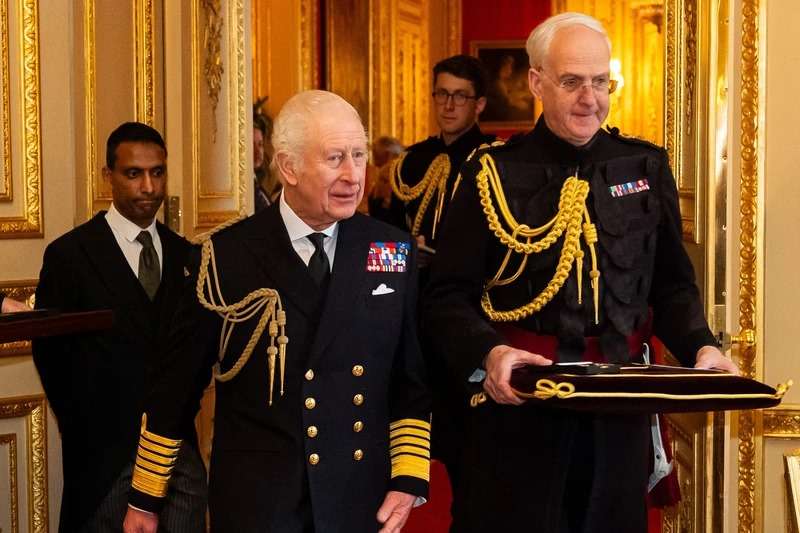
by Mick the Ram
King Charles III has handed out the first batch of specially created awards known as “Elizabeth Emblems” which were handed out to the next of kin of public servants such as police officers and fire fighters, who died in the line of duty.
In total the monarch presented 38 of the honours at an emotional ceremony held at Windsor Castle, with some amongst them having waited many decades to receive some official recognition for their loved-ones bravery.
The design of the award includes a rosemary wreath, which is a traditional symbol of remembrance, and the inscription: “For A Life Given In Service”.
It is understood that in typical fashion of the man, the King took the time to personally review each and every person who was being posthumously honoured, enabling him to familiarise himself with the circumstances that led to the individuals in question losing their lives, and allow him to interact fully with the families.
In some instances, there were special scrolls produced to be handed to wider family members, which Charles had signed especially.
Grieving father instigated creation of award
The emblems have been created as a result of a campaign generated by Bryn Hughes, who lost his police officer daughter, Nicola, back in 2012, after she and her colleague Fiona Bone, responded to a hoax 999 call in Greater Manchester.
The unarmed officers were callously shot and attacked with a hand grenade after being lured to an address by an offender wanted for murder.
Mr Hughes had said he was surprised that there was no official state recognition specifically for emergency service workers who had died in the line of duty, and had decided it was time something was put in place.
Worth the wait
Speaking afterwards he said: “I wouldn’t let it go; I wouldn’t take no for an answer. There wasn’t any resistance or reluctance it just took a lot of time getting it done.”
Paul Bone, Fiona’s father, added: “It’s been a long arduous campaign but it’s been worthwhile, and to see so many families here today receiving it after so many years makes it quite poignant, and quite emotional at times.”
Bravery on all fronts
The 38 former public servants being recognised this time around, died between 1948 and 2019 and included 24 police officers, 12 firefighters, a nursing officer, and a diplomat.
Most of this initial group honoured were from the police and fire services, but it also includes Rebecca Dykes who was killed while working for the Foreign, Commonwealth and Development Office in Lebanon in 2017.
When presenting the emblems, King Charles carefully lifted the awards off a crimson cushion held by Lieutenant Colonel Mike Vernon, Comptroller of the Lord Chamberlain’s Office, and then took his time to chat with the families, who were very appreciative of His Majesty’s knowledge of theirindividual situations.
75 years to be honoured
The earliest honouring was for PC Nathaniel Edgar who was shot in north London way back in 1948, whilst for fire service personnel remembered, the furthest back was Leslie Marsh from West Midlands Fire Service, who died when he fell through the floor of a burning building while fighting a blaze in 1949.
His children, 81-year-old Robert, and 83-year-old Carole proudly took the award from the King, saying it was not only for their father, but also for their mother who had to pick up the pieces of the family after the tragic loss of her husband.
PM’s message
The Prime Minister, Sir Keir Starmer said: “We must never forget those who have given their lives to protect others in the line of duty; while families will never be able to replace their loved ones, the Elizabeth Emblem pays tribute to the sacrifice they have made.”
Multiple applications expected
The Emblem, named in honour of the late Queen Elizabeth II, is the civilian equivalent of the Elizabeth Cross, which recognises members of the UK Armed Forces who die in action or as a result of a terrorist attack.
Families and next of kin of those who have died in public service are now being encouraged to apply for them, including NHS workers who died during the pandemic.
Applications are verified and the George Cross Committee then assesses them, before recommendations are then made to the King and PM.






0 Comments